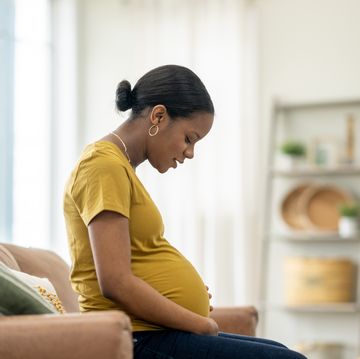According to likely Republican presidential candidate Scott Walker, mandatory ultrasounds for women seeking abortions are important because ultrasounds are a "cool thing" and grandparents look at photos of them on iPhones.
"The media tried to make that sound like that was a crazy idea," Walker, who signed a mandatory ultrasound bill in 2013, told conservative radio host Dana Loesch. "Most people I talked to, whether they're pro-life or not, I find people all the time that pull out their iPhone and show me a picture of their grandkids' ultrasound and how excited they are, so that's a lovely thing."
An ultrasound is a lovely thing — when you want one. But it's true almost across the board that any sometimes-lovely thing can get ugly pretty fast when you're forced into it, whether we're talking about eating cake or having sex or undergoing a medical procedure.
The law Walker signed wasn't about offering women seeking abortions a lovely photo to send to their parents or hang on the fridge; it was about making them feel guilty. The law compelled women not only to undergo the procedure itself, but to sit while a medical technician pointed out the fetus's organs and external features.
"We just knew if we signed that law, if we provided the information, that more people, if they saw that unborn child, would make a decision to protect and keep the life of that unborn child," Walker told Loesch.
That's a common justification for laws requiring intrusive, expensive, and sometimes medically unnecessary ultrasounds: that when women see the ultrasounds, they change their minds. According to the right-wing Family Research Council, various studies show that anywhere from 60 to 98 percent of women who viewed their ultrasounds chose to give birth. According to Republican politician and former House member Michele Bachmann, "A study by Focus on the Family found that when women who were undecided about having an abortion were shown an ultrasound image of the baby, 78 percent chose life."
Just one problem: That's not actually true.
The "studies" cited by the Family Research Council, Bachmann, and other conservative politicians aren't really studies at all — they're largely anecdotes or surveys performed by anti-abortion "crisis pregnancy centers." Which is perhaps more reason not to take medical or scientific advice from people who are neither medical professionals nor scientists (and who don't seem to have much respect for either field).
In fact, mandatory ultrasounds have little impact on women's abortion decisions. That doesn't mean they have no impact — in one actual study published in Obstetrics & Gynecology where women were given the option of viewing their ultrasounds, a small sliver of those who were unsure about their abortion decisions opted to keep the pregnancy after viewing the ultrasound — but the numbers simply aren't anywhere near what anti-abortion mandatory ultrasound proponents claim. And mandating ultrasounds rather than giving women the option of whether or not to view them is less about providing information and more about reminding women that the state thinks they're stupid, morally bad actors.
"Women are very clear that forced government ultrasounds are not 'cool,'" Planned Parenthood Action Fund president Cecile Richards said in a statement. "Forced ultrasounds are intrusive and invasive and they put politicians into medical exam rooms where they don't belong."
Forced ultrasounds are also cruel — being pregnant when you don't want to be is stressful and emotionally difficult, and what women in that situation need is to be treated like human beings in need of medical care, not receptacles for political ideology and anxiety about female sexuality, reproduction, and independent decision-making.
"Cool" would be treating women like people. "Cool" would be letting women go to the doctor without Scott Walker practically sitting next to them on the exam table. Mandatory ultrasounds? Decidedly uncool.
Follow Jill on Twitter.

Jill Filipovic is a contributing writer for cosmopolitan.com. She is the author of OK Boomer, Let's Talk: How My Generation Got Left Behind and The H-Spot: The Feminist Pursuit of Happiness. A weekly CNN columnist and a contributing writer for the New York Times, she is also a lawyer.












